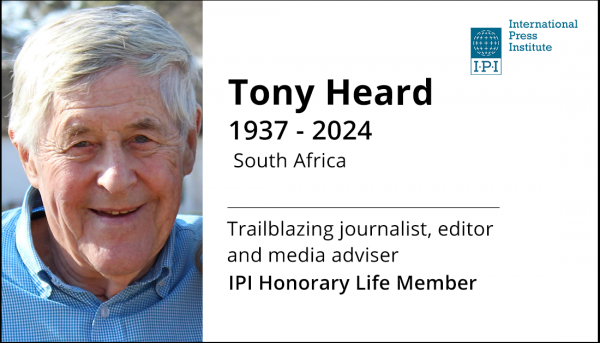H.E. Thabo Mbeki
President of South Africa
The Presidency
Union Buildings, West Wing
Government Avenue
Pretoria 0001
Republic of South Africa
Fax: (+ 2712) 323 82 46 / 2573
Vienna, 9 October 2003
Your Excellency,
The International Press Institute (IPI), the global network of editors, leading journalists and media executives in over 115 countries, strongly criticises the recent decision of the Hefer Commission in South Africa to issue a subpoena against a journalist.
According to information provided to IPI, former Sunday Times (South Africa) journalist Ranjeni Munusamy received a subpoena from the Hefer Commission on 8 October. As a result, the journalist will be forced to testify before the presidential commission in the Bloemfontein Supreme Court on 13 October or face potential legal penalties for either resisting the Chairperson of a commission under the Commissions Act of 1947 or for ignoring a binding subpoena.
The issue of the subpoena against Munusamy concerns a probe commissioned by South African President Thabo Mbeki and chaired by former Court of Appeal Judge President Josephus Hefer into allegations that Bulelani Ngcuka, the National Director of Prosecutions, had been investigated by the ruling African National Congress (ANC) into whether he was an apartheid spy for the National Intelligence Agency in the 1980s.
On this topic, Munusamy was approached by a confidential source who provided her with documents and information regarding the investigation into Ngcuka. She later went to her bosses at the Sunday Times, however, the newspaper refused to publish the story. She then gave the story to a rival publication City Press and co-authored an article on the subject. On learning of this, the Sunday Times suspended Munsamy with a view to disciplining her. She subsequently resigned from the Sunday Times.
IPI notes that on 7 October the secretary to the Commission John Bacon said that witnesses summoned before the body may not refuse to testify or refuse to answer any question. He did say that witnesses might ask not to be identified or give testify in camera. In reaction to receiving the subpoena, Munusamy has said she would refuse to testify on the basis of her duty of confidentiality to the source. She is currently taking legal advice.
With the above in mind, IPI believes that the Commission has erred in its judgement in issuing the subpoena against Munusamy. Rather than forcing the journalist to appear before the Commission, it should have invited the journalist to appear leaving it to her own judgement as to whether she did so or not.
By refusing to follow this path, the Commission now finds itself in the somewhat unenviable position of appearing to use coercive methods to try to compel a journalist to breach her ethical duties to a confidential source. The Commission should recognise that this duty is absolutely fundamental to the work of journalists the world over and it is one that enables journalists to carry out their essential role of scrutinising government practices.
In issuing the subpoena and by refusing to acknowledge the higher duties of the media, the Commission is placing itself on the side of those who reject press freedom and the benefits that naturally flow from it in every society.
Regarding the question of justification for Munusamy’s possible refusal to appear, IPI supports the comments made by the Media Institute for Southern Africa (MISA), the Freedom of Expression Institute (FXI) and the South African National Editor’s Forum (SANEF) that declarations such as “The Declaration of Rights and Obligations of Journalists” (the “Munich Chapter”), and the South African Constitution all provide protection for journalists with regard to confidential sources.
Moreover, IPI wishes to strongly point out to the Commission that its decision flies in the face of the judgements reached by international bodies on the subject of journalists being forced to testify. On 11 December 2002, an appeals panel from the United Nations War Crimes Tribunal in the Hague overturned a decision that former Washington Post journalist Jonathan Randal could be compelled to appear before the Tribunal.
In reaching its decision, the panel agreed with Randal and his lawyers that the personal safety and independence of journalists could be jeopardised if he was forced to testify. The panel also stated that journalists could only be compelled if the information desired was “direct and important” to the case and could not be obtained from other sources. While the decision of the panel is not binding on the Commission, IPI would argue that it is at least persuasive.
Therefore, IPI asks the Commission to rescind the subpoena against Munusamy. By doing so you will be upholding the right of journalists to practice their profession free of restraints and in accordance with Article 19 of the United Nations Universal Declaration of Human Rights.
We thank you for your attention.
Yours sincerely,
Johann P. Fritz
Director


